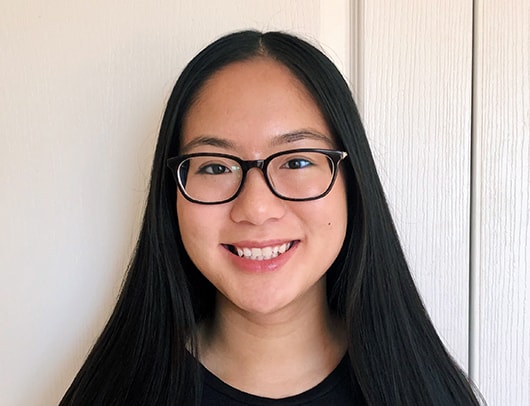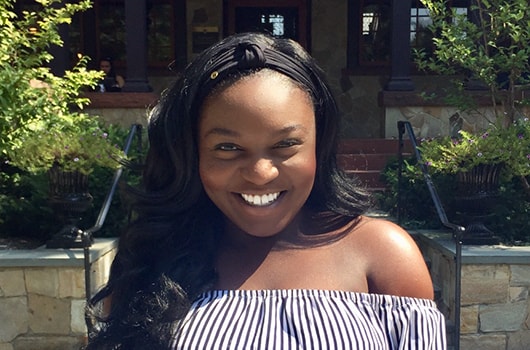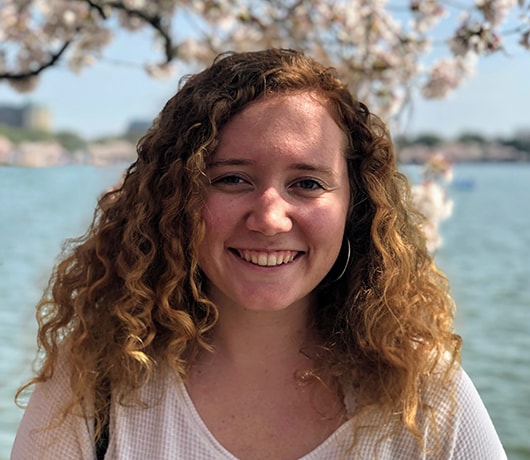Is It Counterproductive to Attend a Small Liberal Arts College
Benefits of attending a small, liberal arts college
Five students share their take on the higher experience at Loyola—a academy large enough for countless opportunities, but small-scale plenty to provide meaningful relationships and mentorship"Stepping onto Loyola'southward campus, a prospective student wouldn't know the endless opportunities that look them. I certainly didn't when I arrived for my first campus tour," Michelle, '22, a writing major from Mount Laurel, North.J., reflects.
"After spending 3 years here, it'southward obvious how much anybody at Loyola—faculty, staff, my peers—is defended to helping you flourish."
Loyola prides itself on deploying the university's full resources to ensure that a transformative feel is bachelor and accessible to every pupil, wherever their hearts and minds lead, from the day they arrive on campus to the twenty-four hour period they set foot into the world after graduation.
"A small pupil population and dedicated faculty and staff help students attain whatever possibility here—whether information technology be academic, social, extra- or co-curricular, research, scholarships, contained study, and study abroad, amidst so many others," Michelle explains.
Opportunities for academic enrichment and internships

For Michelle, individualized attending and intendance from professors, staff, and mentors fostered her transformation into an individual who is confident in herself and her ability to strike into her desired career path after graduation.
From the Honors Program, I've adult into a person who looks by the surface level to catch at deeper meanings and grown confidence in critical thinking and advocating for myself and my ideas.
"It was a difficult process to apply to colleges and cull the correct fit every bit a first-generation student who didn't accept much aid from my parents in the process," she explains.
When she visited Loyola for an Open House for accepted students and attended an information session led by Joe Walsh, Ph.D., professor of Classics and history and director of the Honors Programme, he provided the kickoff nudge that she was on the right path.
"Dr. Walsh spoke with unbridled passion nigh the humanities at Loyola, and I retrieve laughing at the ridiculously long list of reasons he presented for pursuing the humanities at Loyola. He didn't finish the presentation because he didn't have enough fourth dimension. Information technology was articulate to me from that moment that these were the kind of professors I'd accept at Loyola: passionate, defended, and slightly humorous."
Dr. Walsh after reached out to Michelle about the Honors Program. He said there were spots left and, from reviewing her awarding, he thought she might be exactly the kind of educatee who would be a good fit. "This was my beginning opportunity for growth," she says, adding that she has never regretted her decision to utilize subsequently Dr. Walsh'due south email.
Through the Honors Plan, Michelle attends classes with 10-15 other students. Honors courses are seminar-style and designed and then that students actively engage with their peers and professors in give-and-take. "Nosotros are consistently challenging each other to button ideas farther." From the Honors Plan, Michelle says she has become a person who looks for deeper meaning—and she has grown confident in critical thinking and advocating for herself and her ideas.
Beyond her classes, Michelle has discovered opportunities for academic and professional growth through several unlike internships. "There are and so many internship opportunities here in Baltimore or a short train ride away in D.C., and the professors and staff at the Career Center can help students prepare, find, and utilize for them," she shares.
Since her first year, she has held four internships. Her internships have allowed her to develop not only her writing skills just her interpersonal and leadership skills, and they take provided critical opportunities to apply her teaching to a existent-world context in her field.
Opportunities for interest and personal connections after transferring from a large college

Since transferring to Loyola in her sophomore twelvemonth, Angel says Loyola continues to exceed her expectations.
Loyola has prepared me for a life of continuous learning and service to others in the spirit of the Jesuit core value of service, rooted in justice and love. Serving Loyola and surrounding communities through the Center for Customs, Service, and Justice has fueled my desire to give dorsum and do all things with love.
At her previous academy, Affections, who grew upward in Miami, Fla., says she found herself condign "another number, getting lost in the oversupply" at a school ten times the size of Loyola's undergraduate student population. At present she loves making personal connections with her professors. She feels fortunate to engage with them regularly for communication or a quick chat.
A biopsychology major on the pre-med track and an African American Studies minor, Angel has become an active member of the campus customs. By seeking out the endless opportunities to get involved, she had found her domicile at Loyola. She is an intern and tour guide with the Office of Undergraduate Access, a role through which she hopes to help prospective students detect a dwelling on the Evergreen campus as she has; she serves as vice president of equity and inclusion for the Greyhound Ambassadors. She is as well co-vice president and treasurer of Doctors Without Borders and is an Evergreen Orientation Leader.
"There hasn't been a single social club or leadership function I felt like I couldn't sign upwards for. I chop-chop realized it all starts with me just putting myself out in that location and showing upwardly."
As a student of colour, Angel found that Loyola offers many resources to create a supportive surround where students of colour tin can succeed. She has made connections and received guidance from many students, faculty, and staff in the ALANA (African, Latinx, Asian, Native American) customs.
Ane of the things she loves about is seeing herself "represented in spaces on campus, particularly in the social club Sis to Sister. I take truly enjoyed getting to join in on sister circles and engage with other women of colour to talk about our experiences on campus—no matter how challenging or rewarding they might be."
For Angel, her Jesuit education dares her to challenge herself and encourages cocky-exploration through discernment and reflection, "constantly inspiring me to live a purposeful life."
"Serving Loyola and surrounding communities through the Center for Customs, Service, and Justice has fueled my desire to give dorsum and do all things with dearest," she says, adding that Loyola has prepared her for a life of continuous learning and service to others in the spirit of the Jesuit cadre value of service, rooted in justice and love.
Opportunities for research and professional skill evolution

Whitney, '21, says she knew when she was looking at colleges that she wanted inquiry to be a part of her academic program, and she was initially drawn to larger schools for their research opportunities for technology majors. She is majoring in mechanical and materials engineering and minoring in mathematics.
The STEM customs at Loyola is open to discussion about the issues that women in Stalk face every day and are willing to stand up with u.s.a. every bit we fight against sexism and misogyny in our daily life equally scientists, biologists, engineers, and mathematicians.
When she discovered Loyola offered several of the same quality research opportunities for engineering students every bit a larger university—merely with the individualized attention that comes with smaller class size—she knew Loyola was right for her.
Through her courses, the Annapolis, Doc., native has gained practical, applied engineering feel through labs like physics, circuits, and senior design—experiences that affirm she has made the right option for her career.
For six weeks during the summertime between her sophomore and junior year, Whitney was a Hauber Boyfriend working with Suzanne Keilson, Ph.D., acquaintance professor of technology, to design an original inquiry project with Sinai Hospital which used Leap Move to runway the angles of hands to aid physical therapists with their piece of work.
Whitney says she specifically chose a project that assisted others while allowing her to learn a new skill—coding—that pushed her beyond her intellectual comfort zone. And she wasn't alone in this process, she says, considering Dr. Keilson along with other professors helped her throughout the feel. She emerged from the project with valuable skills, conviction, and field experience.
As a adult female in STEM, Whitney says she has found innumerable opportunities for personal and bookish growth through community and female mentorship. In addition to Dr. Keilson, she is grateful to Raeinta Fenner, Ph.D., associate professor of engineering, faculty advisor for the Society of Women Engineers Club. At Loyola, Whitney has discovered a STEM community that includes both professors and students who are "open up to give-and-take about the problems that women in Stalk face every day and are willing to stand with us as nosotros fight confronting sexism and misogyny in our daily life as scientists, biologists, engineers, and mathematicians."
The customs and back up Whitney found at Loyola "has immune me to abound… because I know there is ever a friendly and helpful face to plow to."
Beyond mentorship and research, Whitney has found a wealth of opportunities for leadership, customs engagement, and hands-on experience in her field. She serves as president of the Society of Women Engineers and vice president of Greyhound Ambassadors—roles that foster disquisitional skills like working with a team toward a common goal. When she wanted to appoint with the Baltimore customs through service, Loyola provided opportunities to piece of work with female center school students interested in STEM and to serve with local engineering organizations.
Opportunities for spiritual, athletic, and leadership development

The Jesuit tenant of cura personalis has been at the center of Faith'due south life since she came to Loyola from Williamsburg, Va. This concept of investing in the care for the whole person fabricated her realize she had neglected certain areas in herself before coming to Loyola. Now in her third twelvemonth, Faith credits the university with providing her with an abundance of opportunities to grow athletically, academically, spiritually, and personally.
My personal growth has been fostered through the unyielding kindness and willingness of our fellow staff and advisors, who ensure that in addition to our studies, we have the opportunity to explore areas we would similar to farther grow into.
A member of the Greyhounds swimming and diving team, Faith aims to invest the same attention to her sport and courses equally she does with her spirituality—while also making infinite for things like her newfound passion for Italian culture (she serves as vice president of the Italian Club).
"My development has simply been further fostered by the unyielding kindness and willingness of the staff and advisors at Loyola, who ensure that in addition to our studies, we have the opportunity to explore areas nosotros would like to grow into."
Outside of the pool, Organized religion is involved with several areas of campus life. A Jesuit university, Loyola offers the opportunity for students to engage with their faith in myriad ways; Faith serves equally a Eucharistic Minister with Campus Ministry weekly at the Dominicus morn Mass.
She is as well a tutor at the Study and is actively involved with Hounds athletic mentoring and academic interest clubs such as the Pre-Health Society and Women in Pre-Wellness Society. Terminal year during the pandemic, Faith founded a new social club for Loyola students, like her, seeking enquiry internships and opportunities.
A biology major with an English small, Religion is on the pre-medical rail through Loyola'south Pre-Health Programs. She is grateful for the valuable field feel and professional training she has gained through her work as a medical scribe in the emergency department of Riverside Doctors Infirmary in Williamsburg, Va., during the summertime months and throughout the academic yr, during breaks from Loyola.
This bound, Religion conducted semester-long enquiry alongside Derek Kendig, Ph.D., assistant professor of biology. "In Dr. Kendig's lab, I'chiliad developing imperative skills to raise my college-level thinking that will be tested when I accept my MCAT," says Faith, who plans to attend medical or graduate school—perhaps both—after Loyola and aims to somewhen teach students at a pedagogy infirmary and go on enquiry.
Opportunities for mentorship and meaningful experiences to serve the customs

When Matthew, '21, arrived on Loyola'south campus for Accustomed Students Twenty-four hours as a high school senior, he immediately "felt a sense of belonging" that he hadn't felt at an institution before. Since then, the international business major from Columbia, Md., has defended his time to searching for why Loyola "was such a magnet for me."
Through my feel, I learned to hold myself and others accountable when I witness inequality and injustice. I'grand confident in my ability to exist an amanuensis for change.
Now a college senior, he says, "My Loyola educational activity has been one of the all-time investments my parents and I take made" in function because the resource Loyola provides students are extensive. The academy hosts programs and courses designed for students to use the skills they learned in the classroom into meaningful experiences for the Baltimore community."
Ane of his meaningful experiences came from the France-Merrick Foundation Scholarship, which allowed him to spend his first two years serving at any service site that compelled him in partnership with the Center for Community, Service, and Justice. At the end of his two years, Matthew found his experience so fruitful that he connected his involvement as an intern. "Coming away from this internship, I have learned to concur myself and others accountable when I witness inequality and injustice. I'm confident in my power to exist an agent for change."
During the COVID-xix pandemic, Matthew interned with HOGAN, which allowed him to gain experience in the commercial real estate manufacture, the field he will launch his career in after he graduates in May. He conducted market inquiry and went on site visits with his supervisor, learning more than he would or could accept through classes alone.
Matthew values the relationships he has built during his time at Loyola and shares this advice with swain Greyhounds: "Observe a mentor you can trust, someone who has a broad variety of experiences throughout their lifetime and is willing to invest their cognition in you."
I of his mentors is Rev. Scott Adams, assistant director of Campus Ministry. "He in one case told me, 'You have never seen an apple tree tree swallow itself. The sole purpose of that apple tree is to provide nourishment for others to abound.'" Sort of like a good mentor, he says. "Skillful mentors create a lasting touch on in the lives of their mentees, and in plow, their mentees will soon become mentors for others."
As graduation nears, Matthew reflects on his instruction and experience at Loyola and believes that this academy is "the best identify for a Jesuit liberal arts teaching simply because of the people in our community. [At Loyola, yous'll find] some of the best professors in the nation. They are passionate nearly Loyola's values, which motivates and inspires students."
Source: https://www.loyola.edu/explore/magazine/stories/2021/benefits-of-attending-a-small-liberal-arts-college
Postar um comentário for "Is It Counterproductive to Attend a Small Liberal Arts College"